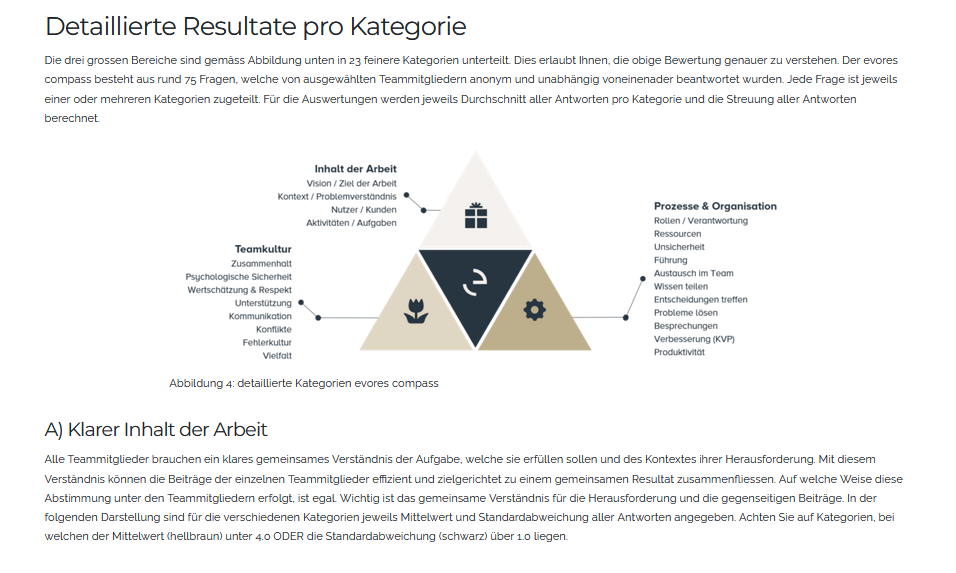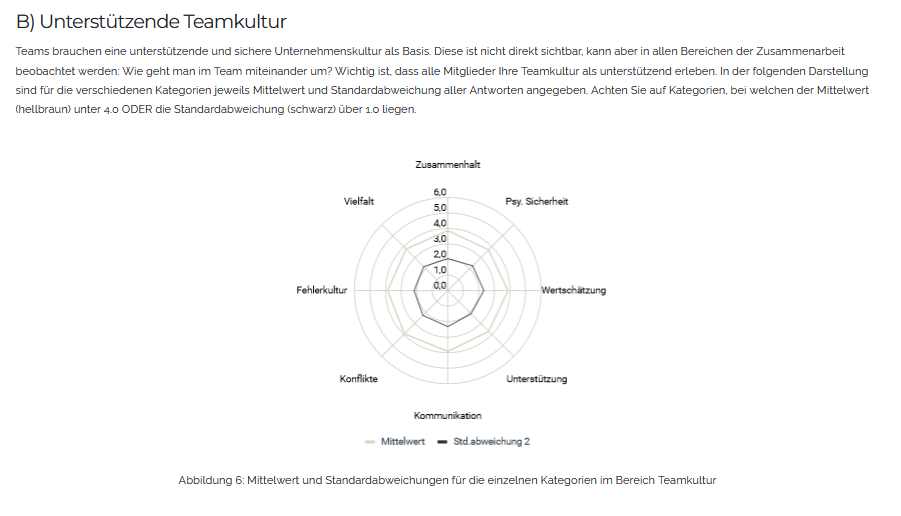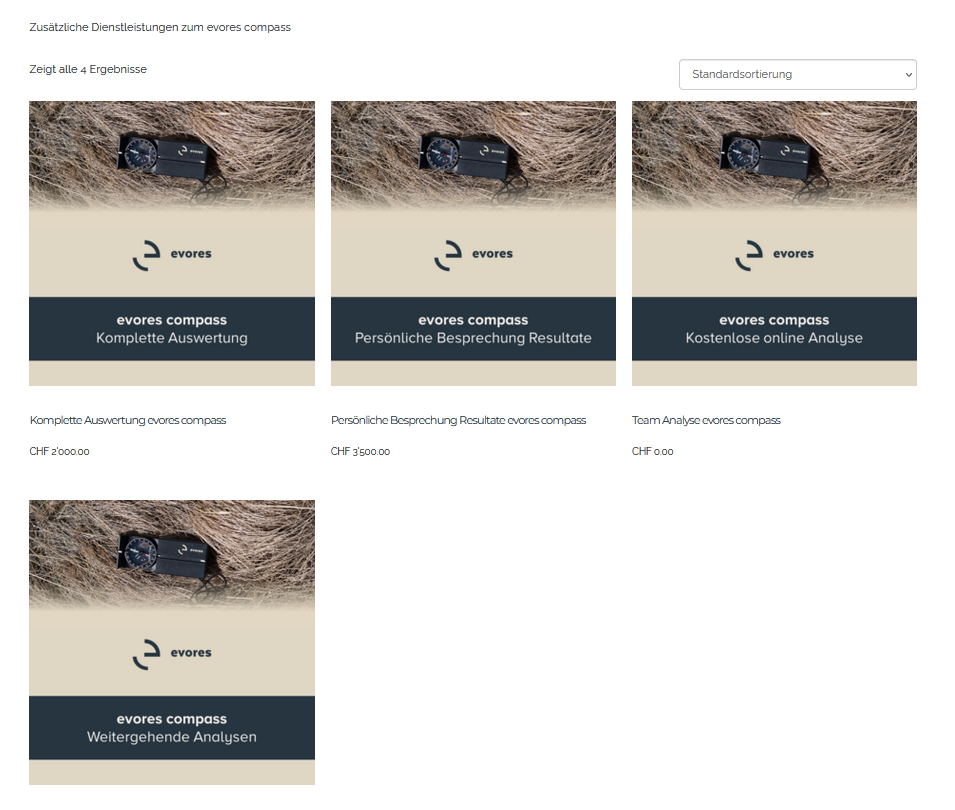
Experience how easy it is to make your team culture and teamwork visible and improve it!
With the evores compass you get a quick and free overview of what is causing problems in your team or could cause problems in the future.
ANALYSIS OF TEAMWORK & CULTURE
The evores compass is a free online tool to analyse the collaboration and culture in your team. The compass quickly gives an overview of 23 different aspects of collaboration that often cause problems. Work more efficiently in your team or company because the contributions of the individual employees are aligned with each other and a common goal. This leads to more joy and less stress at work and your team achieves the results more reliably.
You receive the basic evaluation with all categories free of charge. Support in interpreting the results and improving the situation can be purchased afterwards, depending on your needs.
Use the evores compass when
- your team is not achieving its goals
- employees are stressed and have to constantly put out fires
- employees are frustrated and quit
- you want anonymous and honest feedback on teamwork and team processes
- you want to improve teamwork and invest your time in the right area
You value your staff and their commitment.
You can use the evores compass at regular intervals to assess where you stand. Check at the beginning if the team is ready to start or check on the way what causes problems or could cause problems in the future. Is the work clear? Is the culture supportive and do the processes help?
The tool is a compass, not a cookbook or repair kit. It gives an overview and is designed as a broad analysis with little effort. You do not yet get instructions on how to improve the collaboration or culture afterwards.
Different people in the team complete the same questionnaire online. The questions concern different areas of cooperation in the categories: Content of Work, Team Culture and Processes & Organisation. This gives you an overview of what works well. You also see in which areas there is no common understanding or the team culture and processes are not supportive for all members. These are the areas where your input is needed. Create the foundations for efficient, goal-oriented collaboration.
- Register your project team, department or the entire company on the evores homepage. You will then receive a link for the survey.
- Decide which members of the team should complete the survey. For small teams of less than 10 people, two thirds of the team members should complete the compass. For larger teams or companies of 10 or more people, up to half of the members can participate.
- Send the link for the survey to the selected people. Give precise instructions on which team and project the survey should be completed for and set a time limit. It takes around 15-20min to complete the entire questionnaire.
- Access the results on the homepage and save the results if needed.
- Enjoy new insights and get to work on improving cooperation.
If you would like further support, you can purchase various services individually as needed in the online shop – create the culture and collaboration you desire.
The evores compass was developed and implemented by evores. It is not a new contribution to psychological research and does not claim to be exhaustive. The complete sources of the evores compass are listed here. The aim is to provide a quick overview in order to be able to use the time for further analyses and improvements in the right place.
evores does not assume any liability for unpleasant results. The data protection regulations and the general terms and conditions apply. The availability of the evores compass is not guaranteed (neither survey nor results).

REGISTER YOUR TEAM FOR FREE
evores compass FAQ
The evores compass is basically suitable for all teams, companies and projects where collaboration is important. The size of the team is not important either. The evores compass is certainly particularly helpful for teams that solve complex tasks and therefore have to work particularly closely together, and on the other hand also for diverse teams with very different backgrounds, tasks, etc., where a common understanding and coordination are particularly important.
Depending on the sector, company or project, not all aspects of cooperation are equally important. However, this can be taken into account when evaluating the results, as the results are sorted by category.
The compass is one of the most important and proven tools for orientating oneself outdoors in nature and reaching a destination. It works under practically all conditions and is very robust.
Exactly these characteristics apply to the evores compass. It is the new interpretation of a team questionnaire, available online at any time. If you want to develop collaboration or team culture, the evores compass will show you the direction you can go. Apply the compass regularly on your journey to be able to take new directions again when conditions change or your team has evolved.
For practical and data protection reasons, we would like you to choose the TEAM_ID yourself. Choose an ID that is not easy to guess and does not allow any conclusions.
For the evores sales team, you could choose the following ID in March 22: ev-sales-202203.
Your team is only identified by the TEAM_ID. If the TEAM_ID is known, the results of your team can be retrieved online. However, only the summary of all answers is visible, the individual answers of the team members are anonymous. For this reason, please keep the TEAM_ID confidential.
The same contact person does not have to register more than once, even if he or she wants to have the survey completed more than once for different teams or for the same team. The link for the compass remains the same, each answer is only identified by the TEAM_ID.
IMPORTANT: Choose a unique TEAM_ID for each campaign and share it with all participants.
It is sufficient if you have an overview of the different TEAM_ID. Each answer with the same TEAM_ID will be shown together in the results.
If the results are not displayed for the team you want, click here. carry out the following steps in order:
- Refresh the page (F5 key) – it takes a short time for all calculations to be done.
- Start a new query
- if it doesn’t work, contact me
The topics were compiled from the following sources and selected based on my experience: Theories by Herbert Clark (psycholonguist and psychology professor at Stanford University), Amy Edmondson (professor of leadership and management at Harvard Business Scool), Marshall Rosenberg (psychologist, author and developer of nonviolent communication NVC), Drexler/Sibbet Team Performance Model and lectures HRM Leading Teams (Prof. Dr. Gudela Grote in spring 2017) and Personal Leadership Skills (Dr. Rolf Specht in spring 2018), both at ETH Zurich.
Sources and further information:
Bukowitz, W., & Williams, R. (1999). The Knowledge Management Fieldbook. Harlow: Pearson Education.
Edmondson, A. (1999). Psychological Safety and Learning Behavior in Work Teams. Source: Administrative Science Quarterly, 44(2), 350–383.
Hammond, J. S., Keeney, R. L., & Raiffa, H. (2002). Smart choices: a practical guide to making better life decisions. Harvard Business Review.
Krogerus, M., & Tschäppeler, R. (2017). Das Kommunikationsbuch (2nd ed.). Zürich: Kein & Aber.
Krogerus, M., & Tschäppeler, R. (2019). 50 Erfolgsmodelle. Zürich: Kein & Aber.
Mastrogiacomo, S., & Osterwalder, A. (2021). High-Impact Tools for Teams. Hoboken: John Wiley & Sons.
Sinek, S., Mead, D., & Docker, P. (2017). Find Your Why. A practical guide for discovering purpose for you and your team. Portfolio Penguin. New York: Penguin Random House. TED-Talk




